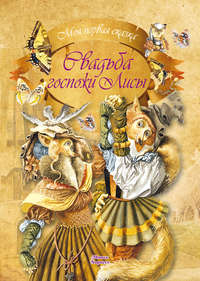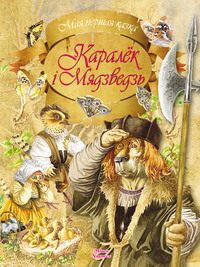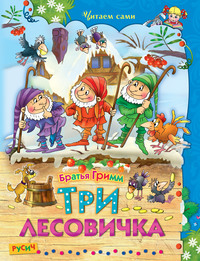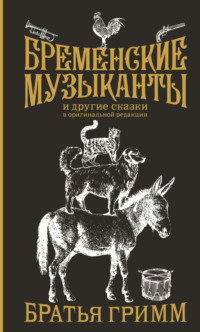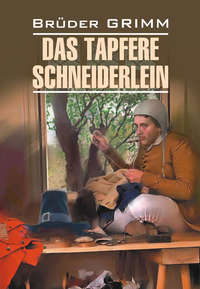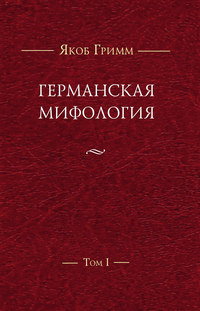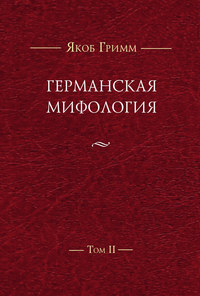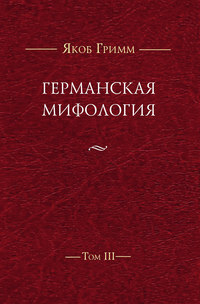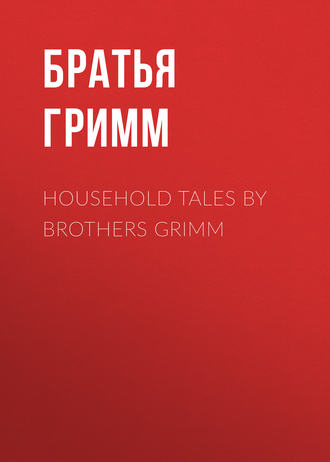 полная версия
полная версияHousehold Tales by Brothers Grimm
Now the King said to his daughter, at the royal table, "What did all the wild animals want, which have been coming to thee, and going in and out of my palace?" She replied, "I may not tell you, but send and have the master of these animals brought, and you will do well." The King sent a servant to the inn, and invited the stranger, and the servant came just as the huntsman had laid his wager with the innkeeper. Then said he, "Behold, sir host, now the King sends his servant and invites me, but I do not go in this way." And he said to the servant, "I request the Lord King to send me royal clothing, and a carriage with six horses, and servants to attend me." When the King heard the answer, he said to his daughter, "What shall I do?" She said, "Cause him to be fetched as he desires to be, and you will do well." Then the King sent royal apparel, a carriage with six horses, and servants to wait on him. When the huntsman saw them coming, he said, "Behold, sir host, now I am fetched as I desired to be," and he put on the royal garments, took the handkerchief with the dragon's tongues with him, and drove off to the King. When the King saw him coming, he said to his daughter, "How shall I receive him?" She answered, "Go to meet him and you will do well." Then the King went to meet him and led him in, and his animals followed. The King gave him a seat near himself and his daughter, and the marshal, as bridegroom, sat on the other side, but no longer knew the huntsman. And now at this very moment, the seven heads of the dragon were brought in as a spectacle, and the King said, "The seven heads were cut off the dragon by the marshal, wherefore to-day I give him my daughter to wife." The the huntsman stood up, opened the seven mouths, and said, "Where are the seven tongues of the dragon?" Then was the marshal terrified, and grew pale and knew not what answer he should make, and at length in his anguish he said, "Dragons have no tongues." The huntsman said, "Liars ought to have none, but the dragon's tongues are the tokens of the victor," and he unfolded the handkerchief, and there lay all seven inside it. And he put each tongue in the mouth to which it belonged, and it fitted exactly. Then he took the handkerchief on which the name of the princess was embroidered, and showed it to the maiden, and asked to whom she had given it, and she replied, "To him who killed the dragon." And then he called his animals, and took the collar off each of them and the golden clasp from the lion, and showed them to the maiden and asked to whom they belonged. She answered, "The necklace and golden clasp were mine, but I divided them among the animals who helped to conquer the dragon." Then spake the huntsman, "When I, tired with the fight, was resting and sleeping, the marshal came and cut off my head. Then he carried away the King's daughter, and gave out that it was he who had killed the dragon, but that he lied I prove with the tongues, the handkerchief, and the necklace." And then he related how his animals had healed him by means of a wonderful root, and how he had travelled about with them for one year, and had at length again come there and had learnt the treachery of the marshal by the inn-keeper's story. Then the King asked his daughter, "Is it true that this man killed the dragon?" And she answered, "Yes, it is true. Now can I reveal the wicked deed of the marshal, as it has come to light without my connivance, for he wrung from me a promise to be silent. For this reason, however, did I make the condition that the marriage should not be solemnized for a year and a day." Then the King bade twelve councillors be summoned who were to pronounce judgment on the marshal, and they sentenced him to be torn to pieces by four bulls. The marshal was therefore executed, but the King gave his daughter to the huntsman, and named him his viceroy over the whole kingdom. The wedding was celebrated with great joy, and the young King caused his father and his foster-father to be brought, and loaded them with treasures. Neither did he forget the inn-keeper, but sent for him and said, "Behold, sir host, I have married the King's daughter, and your house and yard are mine." The host said, "Yes, according to justice it is so." But the young King said, "It shall be done according to mercy," and told him that he should keep his house and yard, and gave him the thousand pieces of gold as well.
And now the young King and Queen were thoroughly happy, and lived in gladness together. He often went out hunting because it was a delight to him, and the faithful animals had to accompany him. In the neighborhood, however, there was a forest of which it was reported that it was haunted, and that whosoever did but enter it did not easily get out again. The young King, however, had a great inclination to hunt in it, and let the old King have no peace until he allowed him to do so. So he rode forth with a great following, and when he came to the forest, he saw a snow-white hart and said to his people, "Wait here until I return, I want to chase that beautiful creature," and he rode into the forest after it, followed only by his animals. The attendants halted and waited until evening, but he did not return, so they rode home, and told the young Queen that the young King had followed a white hart into the enchanted forest, and had not come back again. Then she was in the greatest concern about him. He, however, had still continued to ride on and on after the beautiful wild animal, and had never been able to overtake it; when he thought he was near enough to aim, he instantly saw it bound away into the far distance, and at length it vanished altogether. And now he perceived that he had penetrated deep into the forest, and blew his horn but he received no answer, for his attendants could not hear it. And as night, too, was falling, he saw that he could not get home that day, so he dismounted from his horse, lighted himself a fire near a tree, and resolved to spend the night by it. While he was sitting by the fire, and his animals also were lying down beside him, it seemed to him that he heard a human voice. He looked round, but could perceived nothing. Soon afterwards, he again heard a groan as if from above, and then he looked up, and saw an old woman sitting in the tree, who wailed unceasingly, "Oh, oh, oh, how cold I am!" Said he, "Come down, and warm thyself if thou art cold." But she said, "No, thy animals will bite me." He answered, "They will do thee no harm, old mother, do come down." She, however, was a witch, and said, "I will throw down a wand from the tree, and if thou strikest them on the back with it, they will do me no harm." Then she threw him a small wand, and he struck them with it, and instantly they lay still and were turned into stone. And when the witch was safe from the animals, she leapt down and touched him also with a wand, and changed him to stone. Thereupon she laughed, and dragged him and the animals into a vault, where many more such stones already lay.
As, however, the young King did not come back at all, the Queen's anguish and care grew constantly greater. And it so happened that at this very time the other brother who had turned to the east when they separated, came into the kingdom. He had sought a situation, and had found none, and had then travelled about here and there, and had made his animals dance. Then it came into his mind that he would just go and look at the knife that they had thrust in the trunk of a tree at their parting, that he might learn how his brother was. When he got there his brother's side of the knife was half rusted, and half bright. Then he was alarmed and thought, "A great misfortune must have befallen my brother, but perhaps I can still save him, for half the knife is still bright." He and his animals travelled towards the west, and when he entered the gate of the town, the guard came to meet him, and asked if he was to announce him to his consort the young Queen, who had for a couple of days been in the greatest sorrow about his staying away, and was afraid he had been killed in the enchanted forest? The sentries, indeed, thought no otherwise than that he was the young King himself, for he looked so like him, and had wild animals running behind him. Then he saw that they were speaking of his brother, and thought, "It will be better if I pass myself off for him, and then I can rescue him more easily." So he allowed himself to be escorted into the castle by the guard, and was received with the greatest joy. The young Queen indeed thought that he was her husband, and asked him why he had stayed away so long. He answered, "I had lost myself in a forest, and could not find my way out again any sooner." At night he was taken to the royal bed, but he laid a two-edged sword between him and the young Queen; she did not know what that could mean, but did not venture to ask.
He remained in the palace a couple of days, and in the meantime inquired into everything which related to the enchanted forest, and at last he said, "I must hunt there once more." The King and the young Queen wanted to persuade him not to do it, but he stood out against them, and went forth with a larger following. When he had got into the forest, it fared with him as with his brother; he saw a white hart and said to his people, "Stay here, and wait until I return, I want to chase the lovely wild beast," and then he rode into the forest and his animals ran after him. But he could not overtake the hart, and got so deep into the forest that he was forced to pass the night there. And when he had lighted a fire, he heard some one wailing above him, "Oh, oh, oh, how cold I am!" Then he looked up, and the self-same witch was sitting in the tree. Said he, "If thou art cold, come down, little old mother, and warm thyself." She answered, "No, thy animals will bite me." But he said, "They will not hurt thee." Then she cried, "I will throw down a wand to thee, and if thou smitest them with it they will do me no harm." When the huntsman heard that, he had no confidence in the old woman, and said, "I will not strike my animals. Come down, or I will fetch thee." Then she cried, "What dost thou want? Thou shalt not touch me." But he replied, "If thou dost not come, I will shoot thee." Said she, "Shoot away, I do not fear thy bullets!" Then he aimed, and fired at her, but the witch was proof against all leaden bullets, and laughed, and yelled and cried, "Thou shalt not hit me." The huntsman knew what to do, tore three silver buttons off his coat, and loaded his gun with them, for against them her arts were useless, and when he fired she fell down at once with a scream. Then he set his foot on her and said, Old witch, if thou dost not instantly confess where my brother is, I will seize thee with both my hands and throw thee into the fire. She was in a great fright, begged for mercy and said, He and his animals lie in a vault, turned to stone. Then he compelled her to go thither with him, threatened her, and said, Old sea-cat, now shalt thou make my brother and all the human beings lying here, alive again, or thou shalt go into the fire! She took a wand and touched the stones, and then his brother with his animals came to life again, and many others, merchants, artizans, and shepherds, arose, thanked him for their deliverance, and went to their homes. But when the twin brothers saw each other again, they kissed each other and rejoiced with all their hearts. Then they seized the witch, bound her and laid her on the fire, and when she was burnt the forest opened of its own accord, and was light and clear, and the King's palace could be seen at about the distance of a three hours walk.
Thereupon the two brothers went home together, and on the way told each other their histories. And when the youngest said that he was ruler of the whole country in the King's stead, the other observed, "That I remarked very well, for when I came to the town, and was taken for thee, all royal honours were paid me; the young Queen looked on me as her husband, and I had to eat at her side, and sleep in thy bed." When the other heard that, he became so jealous and angry that he drew his sword, and struck off his brother's head. But when he saw him lying there dead, and saw his red blood flowing, he repented most violently: "My brother delivered me," cried he, "and I have killed him for it," and he bewailed him aloud. Then his hare came and offered to go and bring some of the root of life, and bounded away and brought it while yet there was time, and the dead man was brought to life again, and knew nothing about the wound.
After this they journeyed onwards, and the youngest said, "Thou lookest like me, hast royal apparel on as I have, and the animals follow thee as they do me; we will go in by opposite gates, and arrive at the same time from the two sides in the aged King's presence." So they separated, and at the same time came the watchmen from the one door and from the other, and announced that the young King and the animals had returned from the chase. The King said, "It is not possible, the gates lie quite a mile apart." In the meantime, however, the two brothers entered the courtyard of the palace from opposite sides, and both mounted the steps. Then the King said to the daughter, "Say which is thy husband. Each of them looks exactly like the other, I cannot tell." Then she was in great distress, and could not tell; but at last she remembered the necklace which she had given to the animals, and she sought for and found her little golden clasp on the lion, and she cried in her delight, "He who is followed by this lion is my true husband". Then the young King laughed and said, "Yes, he is the right one," and they sat down together to table, and ate and drank, and were merry. At night when the young King went to bed, his wife said, "Why hast thou for these last nights always laid a two-edged sword in our bed? I thought thou hadst a wish to kill me." Then he knew how true his brother had been.
61 The Little Peasant
There was a certain village wherein no one lived but really rich peasants, and just one poor one, whom they called the little peasant. He had not even so much as a cow, and still less money to buy one, and yet he and his wife did so wish to have one. One day he said to her, "Hark you, I have a good thought, there is our gossip the carpenter, he shall make us a wooden calf, and paint it brown, so that it look like any other, and in time it will certainly get big and be a cow." The woman also liked the idea, and their gossip the carpenter cut and planed the calf, and painted it as it ought to be, and made it with its head hanging down as if it were eating.
Next morning when the cows were being driven out, the little peasant called the cow-herd and said, "Look, I have a little calf there, but it is still small and has still to be carried." The cow-herd said, "All right, and took it in his arms and carried it to the pasture, and set it among the grass." The little calf always remained standing like one which was eating, and the cow-herd said, "It will soon run alone, just look how it eats already!" At night when he was going to drive the herd home again, he said to the calf, "If thou canst stand there and eat thy fill, thou canst also go on thy four legs; I don't care to drag thee home again in my arms." But the little peasant stood at his door, and waited for his little calf, and when the cow-herd drove the cows through the village, and the calf was missing, he inquired where it was. The cow-herd answered, "It is still standing out there eating. It would not stop and come with us." But the little peasant said, "Oh, but I must have my beast back again." Then they went back to the meadow together, but some one had stolen the calf, and it was gone. The cow-herd said, "It must have run away." The peasant, however, said, "Don't tell me that," and led the cow-herd before the mayor, who for his carelessness condemned him to give the peasant a cow for the calf which had run away.
And now the little peasant and his wife had the cow for which they had so long wished, and they were heartily glad, but they had no food for it, and could give it nothing to eat, so it soon had to be killed. They salted the flesh, and the peasant went into the town and wanted to sell the skin there, so that he might buy a new calf with the proceeds. On the way he passed by a mill, and there sat a raven with broken wings, and out of pity he took him and wrapped him in the skin. As, however, the weather grew so bad and there was a storm of rain and wind, he could go no farther, and turned back to the mill and begged for shelter. The miller's wife was alone in the house, and said to the peasant, "Lay thyself on the straw there", and gave him a slice of bread with cheese on it. The peasant ate it, and lay down with his skin beside him, and the woman thought, "He is tired and has gone to sleep." In the meantime came the parson; the miller's wife received him well, and said, "My husband is out, so we will have a feast." The peasant listened, and when he heard about feasting he was vexed that he had been forced to make shift with a slice of bread with cheese on it. Then the woman served up four different things, roast meat, salad, cakes, and wine.
Just as they were about to sit down and eat, there was a knocking outside. The woman said, "Oh, heavens! It is my husband!" She quickly hid the roast meat inside the tiled stove, the wine under the pillow, the salad on the bed, the cakes under it, and the parson in the cupboard in the entrance. Then she opened the door for her husband, and said, "Thank heaven, thou art back again! There is such a storm, it looks as if the world were coming to an end." The miller saw the peasant lying on the straw, and asked, "What is that fellow doing there?" "Ah," said the wife, "the poor knave came in the storm and rain, and begged for shelter, so I gave him a bit of bread and cheese, and showed him where the straw was." The man said, "I have no objection, but be quick and get me something to eat." The woman said, "But I have nothing but bread and cheese." "I am contented with anything," replied the husband, "so far as I am concerned, bread and cheese will do," and looked at the peasant and said, "Come and eat some more with me." The peasant did not require to be invited twice, but got up and ate. After this the miller saw the skin in which the raven was, lying on the ground, and asked, "What hast thou there?" The peasant answered, "I have a soothsayer inside it." "Can he foretell anything to me?" said the miller. "Why not?" answered the peasant, "but he only says four things, and the fifth he keeps to himself." The miller was curious, and said, "Let him foretell something for once." Then the peasant pinched the raven's head, so that he croaked and made a noise like krr, krr. The miller said, "What did he say?" The peasant answered, "In the first place, he says that there is some wine hidden under the pillow." "Bless me!" cried the miller, and went there and found the wine. "Now go on," said he. The peasant made the raven croak again, and said, "In the second place, he says that there is some roast meat in the tiled stove." "Upon my word!" cried the miller, and went thither, and found the roast meat. The peasant made the raven prophesy still more, and said, "Thirdly, he says that there is some salad on the bed." "That would be a fine thing!" cried the miller, and went there and found the salad. At last the peasant pinched the raven once more till he croaked, and said, "Fourthly, he says that there are some cakes under the bed." "That would be a fine thing!" cried the miller, and looked there, and found the cakes.
And now the two sat down to the table together, but the miller's wife was frightened to death, and went to bed and took all the keys with her. The miller would have liked much to know the fifth, but the little peasant said, "First, we will quickly eat the four things, for the fifth is something bad." So they ate, and after that they bargained how much the miller was to give for the fifth prophesy, until they agreed on three hundred thalers. Then the peasant once more pinched the raven's head till he croaked loudly. The miller asked, "What did he say?" The peasant replied, "He says that the Devil is hiding outside there in the cupboard in the entrance." The miller said, "The Devil must go out," and opened the house-door; then the woman was forced to give up the keys, and the peasant unlocked the cupboard. The parson ran out as fast as he could, and the miller said, "It was true; I saw the black rascal with my own eyes." The peasant, however, made off next morning by daybreak with the three hundred thalers.
At home the small peasant gradually launched out; he built a beautiful house, and the peasants said, "The small peasant has certainly been to the place where golden snow falls, and people carry the gold home in shovels." Then the small peasant was brought before the Mayor, and bidden to say from whence his wealth came. He answered, "I sold my cow's skin in the town, for three hundred thalers." When the peasants heard that, they too wished to enjoy this great profit, and ran home, killed all their cows, and stripped off their skins in order to sell them in the town to the greatest advantage. The Mayor, however, said, "But my servant must go first." When she came to the merchant in the town, he did not give her more than two thalers for a skin, and when the others came, he did not give them so much, and said, "What can I do with all these skins?"
Then the peasants were vexed that the small peasant should have thus overreached them, wanted to take vengeance on him, and accused him of this treachery before the Mayor. The innocent little peasant was unanimously sentenced to death, and was to be rolled into the water, in a barrel pierced full of holes. He was led forth, and a priest was brought who was to say a mass for his soul. The others were all obliged to retire to a distance, and when the peasant looked at the priest, he recognized the man who had been with the miller's wife. He said to him, "I set you free from the cupboard, set me free from the barrel." At this same moment up came, with a flock of sheep, the very shepherd who as the peasant knew had long been wishing to be Mayor, so he cried with all his might, "No, I will not do it; if the whole world insists on it, I will not do it!" The shepherd hearing that, came up to him, and asked, "What art thou about? What is it that thou wilt not do?" The peasant said, "They want to make me Mayor, if I will but put myself in the barrel, but I will not do it." The shepherd said, "If nothing more than that is needful in order to be Mayor, I would get into the barrel at once." The peasant said, "If thou wilt get in, thou wilt be Mayor." The shepherd was willing, and got in, and the peasant shut the top down on him; then he took the shepherd's flock for himself, and drove it away. The parson went to the crowd, and declared that the mass had been said. Then they came and rolled the barrel towards the water. When the barrel began to roll, the shepherd cried, "I am quite willing to be Mayor." They believed no otherwise than that it was the peasant who was saying this, and answered, "That is what we intend, but first thou shalt look about thee a little down below there," and they rolled the barrel down into the water.
After that the peasants went home, and as they were entering the village, the small peasant also came quietly in, driving a flock of sheep and looking quite contented. Then the peasants were astonished, and said, "Peasant, from whence comest thou? Hast thou come out of the water?" "Yes, truly," replied the peasant, "I sank deep, deep down, until at last I got to the bottom; I pushed the bottom out of the barrel, and crept out, and there were pretty meadows on which a number of lambs were feeding, and from thence I brought this flock away with me." Said the peasants, "Are there any more there?" "Oh, yes," said he, "more than I could do anything with." Then the peasants made up their minds that they too would fetch some sheep for themselves, a flock apiece, but the Mayor said, "I come first." So they went to the water together, and just then there were some of the small fleecy clouds in the blue sky, which are called little lambs, and they were reflected in the water, whereupon the peasants cried, "We already see the sheep down below!" The Mayor pressed forward and said, "I will go down first, and look about me, and if things promise well I'll call you." So he jumped in; splash! went the water; he made a sound as if he were calling them, and the whole crowd plunged in after him as one man. Then the entire village was dead, and the small peasant, as sole heir, became a rich man.


